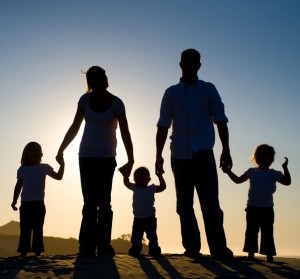 I recently posted the article “Where Family is Everything,” which describes a Somali person who defines his or her identity entirely in terms of the larger family. Biblical peoples thought much this way too.
I recently posted the article “Where Family is Everything,” which describes a Somali person who defines his or her identity entirely in terms of the larger family. Biblical peoples thought much this way too.
Here’s an interesting exercise for you – try giving your own biblical “self-introduction.” Nowadays you’d tell about yourself to someone new by talking about your job, your education and your personal interests. But consider how you’d conceive of your life in biblical times.
I wrote the following exercise for a Bible class I taught a few years ago. Feel free to fill in the blanks for yourself.
~~~
1. I am (first name) of the tribe of (last name).
2. My tribe worships … (give the name(s) of the god or gods you worship, whether they are Jehovah, Jesus, Baal, Allah, Mammon…). You may just want to say “the True God of Heaven and Earth, the Lord God Almighty.” (See Jonah 1:8-9 for how he introduces himself.)
3. My family are _________ (list some defining characteristics of your family). Do you come from a family of merchants, farmers, musicians, builders, or preachers? Do you have an ancestor who was known for some great deed? (Married women, feel free to list the characteristics of your own family or your husband’s family.)
4. I am of the people of (geographical group that you feel most connected with as your “people,” whether it is Detroit, or Michigan, or America, etc…) Has your clan migrated from some other area?
5. I am the (firstborn, 2nd, 3rd) son/daughter of (father’s first name). My father was the (firstborn, 2nd, 3rd born) son in the tribe of (Last name). (Note: firstborn sons are very highly esteemed!)
Married women – answer above with, “I am the wife of , (firstborn, 2nd, 3rd born) son in the tribe of (last name).
6. I am the father/mother of (#) of sons and of (#) grandsons. This, of course, is your source of greatest honor. If you are a grandmother or grandfather of a mighty clan, you deserve high acclaim indeed!
~~~
Thought for reflection – what differences do you feel about your role in society when you define yourself this way?
Jennifer Dunn says
I was in a conversation with my sister recently about why many women choose to keep their last names when they get married. She explained that in the past women changed their names to attach themselves to stronger and wealthier families thus garnering esteem for their connections. That changing the last name is something not neccessary, but became popular in our culture. I am interested in your thoughts on this.
Lois Tverberg says
My understanding is that the reason less women have changed their names in recent decades is because they work outside the home and have a professional identity that they want to maintain. In former times, women changed their names no matter what their husband’s family’s status was, not just because of his connections, but because of the new family the couple had formed. Since a woman’s identity came from the success of the family, it was more important for them to have a single name than for her to keep a separate identity. (There were cultures that have done things differently, of course.)